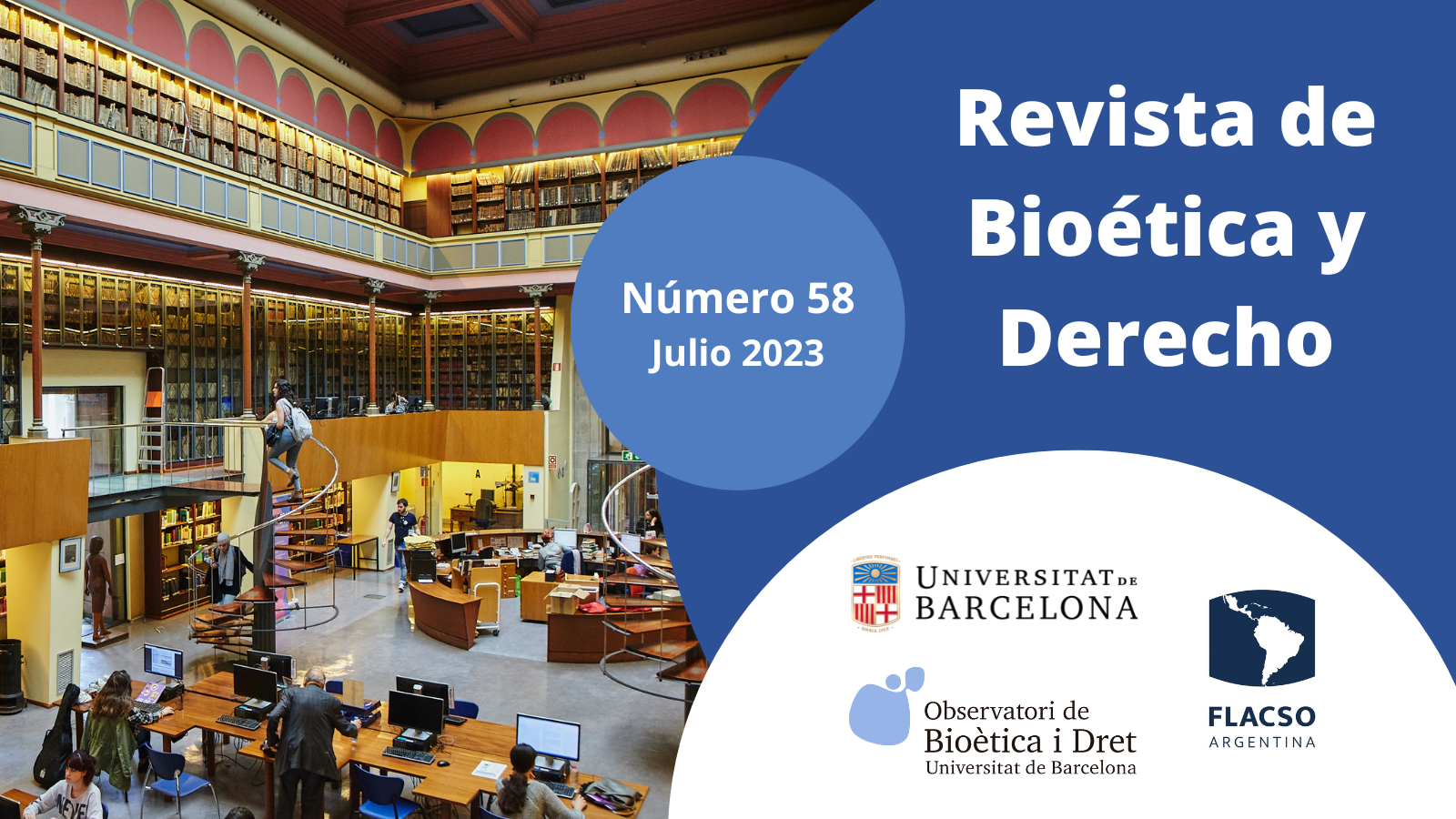Bioprecariousness. The power of patents and their impact on Public Health
DOI:
https://doi.org/10.1344/rbd2023.58.39484Keywords:
patents, law, bioethics, public health, human rights, bioprecariousnessAbstract
This article is focused on the analysis of the power of patents and their role in the current confrontation between the right to (public) health and the right to Intellectual property (patents), which are both human rights recognised by the Universal Declaration of Human Rights. This power is based on the monopoly controlling life (biological material) by means of biotechnological patents or “patents of life”. The Spanish Patent and Trademark Office defines a patent as “a title recognising the right to exclusively exploit an invention, preventing third parties from manufacturing, selling or using it without prior consent of the owner”. This monopoly involves high prices for patented products, which condemns thousands of people to what we call “bioprecariousness” defined as structural violence against life due to the lack of access to basic patented products (vaccines, seeds, medicines, treatments and tests). Bioprecariousness has also been present in the Covid-19 pandemic, given that there has been an unequal distribution of vaccines between rich and poor countries. We propose a new ethical framework and ethical patent committees aimed at setting ethical limits to patents according to the criteria of responsibility and caution; global justice, and capabilities and human development.
References
Aristóteles (1998). Ética Nicomaquéa. Ética Eudemia. Madrid: Editorial Gredos.
Arendt, H. (2014). Sobre la revolución, Barcelona: Alianza Editorial.
Camps, V. (1993). Virtudes públicas. Madrid: Espasa Calpe.
Camps, V. (2021). Ponencia de Clausura. III Congreso Internacional sobre Filosofía de la Salud Pública. Barcelona, septiembre.
Casado, M; López Baroni, M.J (2018). Manual de bioética laica. Barcelona: Edicions de la Universitat de Barcelona.
Dopazo, P. (2017). Protección jurídica de las invenciones biotecnológicas en el derecho español (Ley 24/2015, de 24 de julio, de Patentes, en vigor el 1 de abril de 2017. Actualidad Jurídica Ambiental. [En línea]. Disponible en: http://www.actualidadjuridicaambiental.com/wp-content/uploads/2017/02/2017_03_01_Dopazo_Biotecnologia-Patentes.pdf
Foucault, M. (1982). Vigilar y castigar. Madrid: Siglo XXI Editores, S.A.
Foucault, M. (1989). Historia de la sexualidad. La voluntad de saber, Madrid: Siglo XXI.
GlaxoSmithKline. GSK and 23andMe sing agreement to leverage genetic insights for the development of novel medicines. [en línea]. Disponible en: https://www.gsk.com/en-gb/media/press-releases/gsk-and-23andme-sign-agreement-to-leverage-genetic-insights-for-the-development-of-novel-medicines/ [Consulta: 18.04.2022].
Health Impact Fund. https://healthimpactfund.org/es
Infosalus. [en línea]. Disponible en: https://www.infosalus.com/actualidad/noticia-salud-derecho-ve-descafeinado-acuerdo-suspender-temporalmente-patentes-vacunas-contra-covid-19-20220316184324.html. [Consulta: 15.04.2022].
Jimeno, Ramírez, S (2018). Poder de las patentes y bioprecariedad: cuestiones de legalidad y legitimidad. [en línea]. Disponible en: http://diposit.ub.edu/dspace/handle/2445/124829.
Jimeno Ramírez, S (2022). Transhumanismo y justicia pos(humana). En: Bio.etica blog. [en línea]. Disponible en: https://www.bioeticablog.com/transhumanismo-y-justicia-poshumana/[Consulta: 18.09.2022].
López Baroni, M.J (2019). Las Tres Europas frente a la encrucijada genómica. Revista de Bioética y Derecho, número 47, 77-92. [En línea]. Disponible en: https://revistes.ub.edu/index.php/RBD/article/view/28937/29609 [Consulta: 17.09.2022].
López Baroni, M (2018). Bioética y tecnologías disruptivas. Barcelona: Herder editorial.
López Baroni, M.J (2017). El criterio de demarcación en las biopatentes. Anales de la Cátedra Francisco Suárez, número 52, 131-153 [En línea]. Disponible en: https://revistaseug.ugr.es/index.php/acfs/article/view/6030/5675 [Consulta: 17.09.2022].
Jonas, H (1995). El principio de responsabilidad, Barcelona: Herder.
Margalit, A (1997). La sociedad decente. Barcelona: Paidós.
Medicines Patent Pool. https://medicinespatentpool.org
Nussbaum, M. (2012). Crear capacidades. Propuesta para el desarrollo humano [Traducción: Albino Santos Mosquera]. Barcelona: Paidós.
Oficina Española de Patentes y Marcas. [En línea]. Disponible en: https://www.oepm.es/es/propiedad_industrial/preguntas_frecuentes/FaqCuestiones04.html?modalidadFaq=noSel. [Consulta: 16.09.2022].
Organización Panamericana de la Salud. https://www.paho.org/es/temas/determinantes-sociales-salud. [Consulta: 0.04.2022]
Organización de las Naciones Unidas. Declaración Universal de Derechos Humanos. [En línea]. Disponible en: https://www.un.org/es/about-us/universal-declaration-of-human-rights
Organización Mundial del Comercio. https://www.wto.org/spanish/tratop_s/trips_s/trips_s.htm. [Consulta: 08.04.2022]
Organización Mundial del Comercio. Los ADPIC, el sistema de Propiedad Intelectual y la COVID-19. https://www.wto.org/spanish/tratop_s/trips_s/trips_and_covid19_s.htm
Organización Mundial del Comercio. Duodécima Conferencia Ministerial de la OMC. https://www.wto.org/spanish/thewto_s/minist_s/mc12_s/mc12_s.htm
Organización Mundial de la Propiedad Intelectual. Patent Landscape Report: Covid-19-related vaccines and therapeutics. [En línea]. Disponible en: https://www.wipo.int/patentscope/en/programs/patent_landscapes/
Organización Mundial de la Salud. https://www.who.int/news-room/questions-and-answers/item/neglected-tropical-diseases.
Organización Mundial de la Salud. https://www.wto.org/spanish/thewto_s/minist_s/mc12_s/mc12_s.htm
Orrantia Cavazos, R. (2022). COVID-19 y Justicia social: un enfoque sindémico de la resistencia a la vacunación. Revista de Bioética y Derecho, número 54, 23-46. [En línea]. Disponible en: https://revistes.ub.edu/index.php/RBD/issue/view/2661/301 . [Consulta: 9.04.2022].
Ortega Gómez, M. El derecho de acceso a los medicamentos y el derecho de patente en países en desarrollo, Revista de Bioética y Derecho, número 37, 23-36. [En línea]. Disponible en: https://revistes.ub.edu/index.php/RBD/article/view/16148/19155 [Consulta: 18.09.2022].
Pogge, T. ¿Qué es justicia global? Economía Institucional [En línea]. Disponible en: https://www.redalyc.org [Consulta: 10.04.2002].
Rifkin, J. (1998) Entrevista en The Unesco Courier. [En línea]. Disponible en: https://unesdoc.unesco.org/ark:/48223/pf0000113378_spa. [Consulta: 11.04.2022].
Legislación
Oficina Europea de Patentes. The European Patent Convention (EPC), 14ª edición. Alemania: EPO, 2010. [En línea]. Disponible en: http://www.epo.org/law-practice/legal-texts/epc.html. [Consulta: 10.04.2022]
Europa. Directiva 98/44/CE del Parlamento Europeo y del Consejo de 6 de julio de 1998 relativa a la protección jurídica de las invenciones biotecnológicas [en línea]. EUR-Lex, Diario Oficial, 6 de julio de 1998, nº L 213 de 30/07/1998, p.0013-0021. Disponible en: https://eur-lex.europa.eu/legal-content/ES/TXT/?uri=CELEX:31998L0044.
Downloads
Published
How to Cite
Issue
Section
License
Copyright (c) 2023 SONIA JIMENO RAMÍREZ

This work is licensed under a Creative Commons Attribution-NonCommercial-NoDerivatives 4.0 International License.
 The author retains the copyright and grants Revista de Bioética y Derecho the right of first publication of the article. All articles published in Revista de Bioética y Derecho are under Creative Commons licensing Recognition – Non Commercial – NoDerivedArtwork (by-nc-nd 4.0), which allows sharing the content with third parties, provided that they acknowledge its authorship, initial publication in this journal and the terms of the license. No commercial use of the original work or generation of derivative works is permitted.
The author retains the copyright and grants Revista de Bioética y Derecho the right of first publication of the article. All articles published in Revista de Bioética y Derecho are under Creative Commons licensing Recognition – Non Commercial – NoDerivedArtwork (by-nc-nd 4.0), which allows sharing the content with third parties, provided that they acknowledge its authorship, initial publication in this journal and the terms of the license. No commercial use of the original work or generation of derivative works is permitted.







